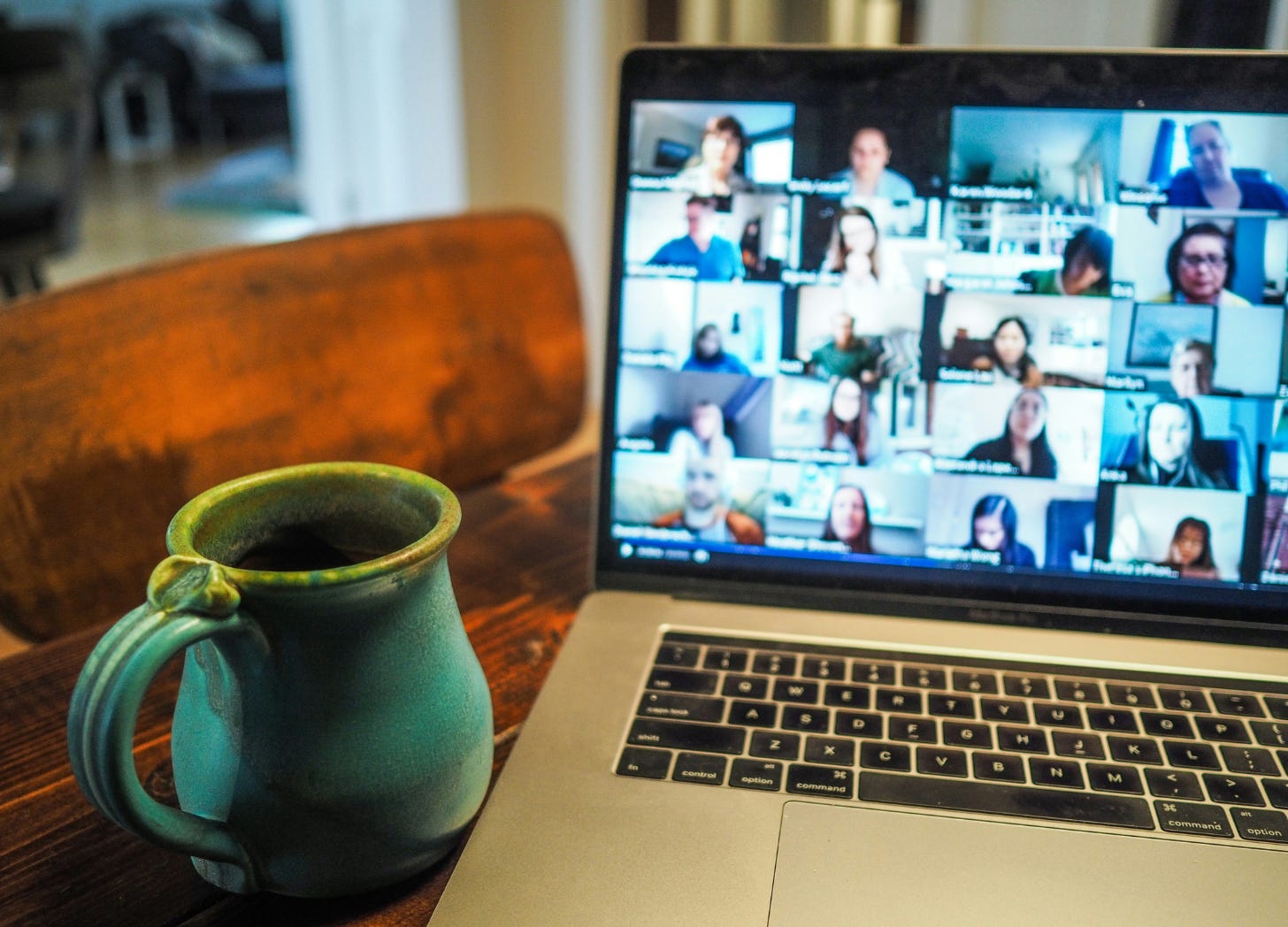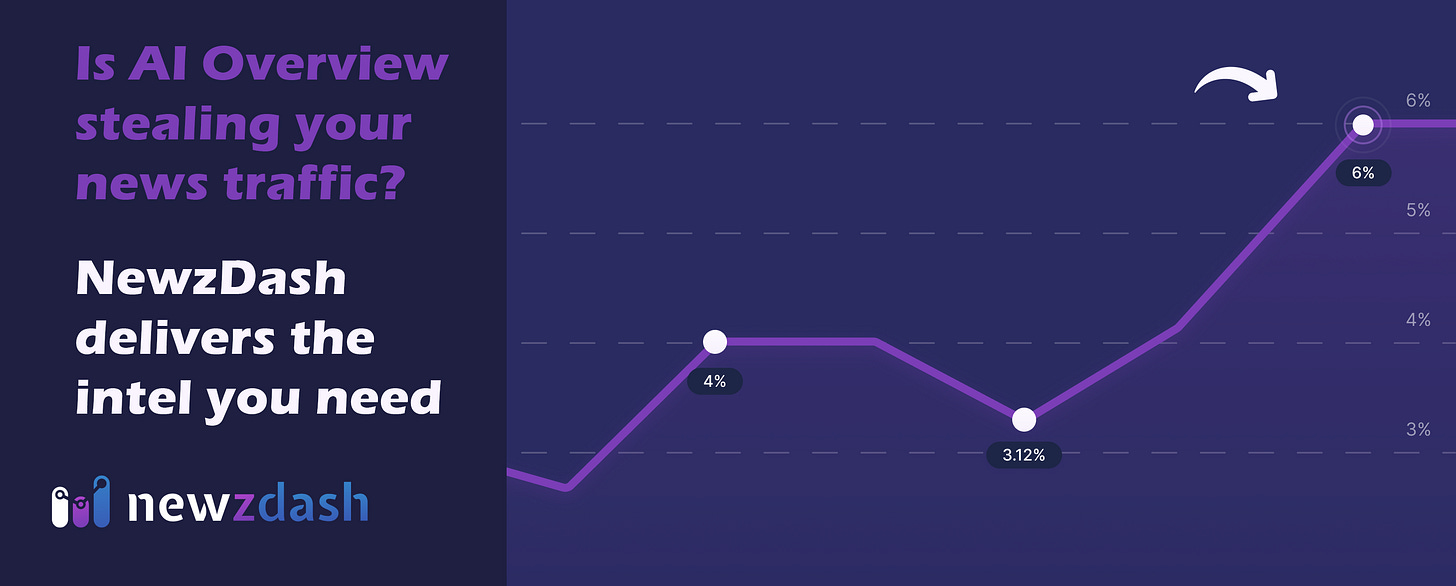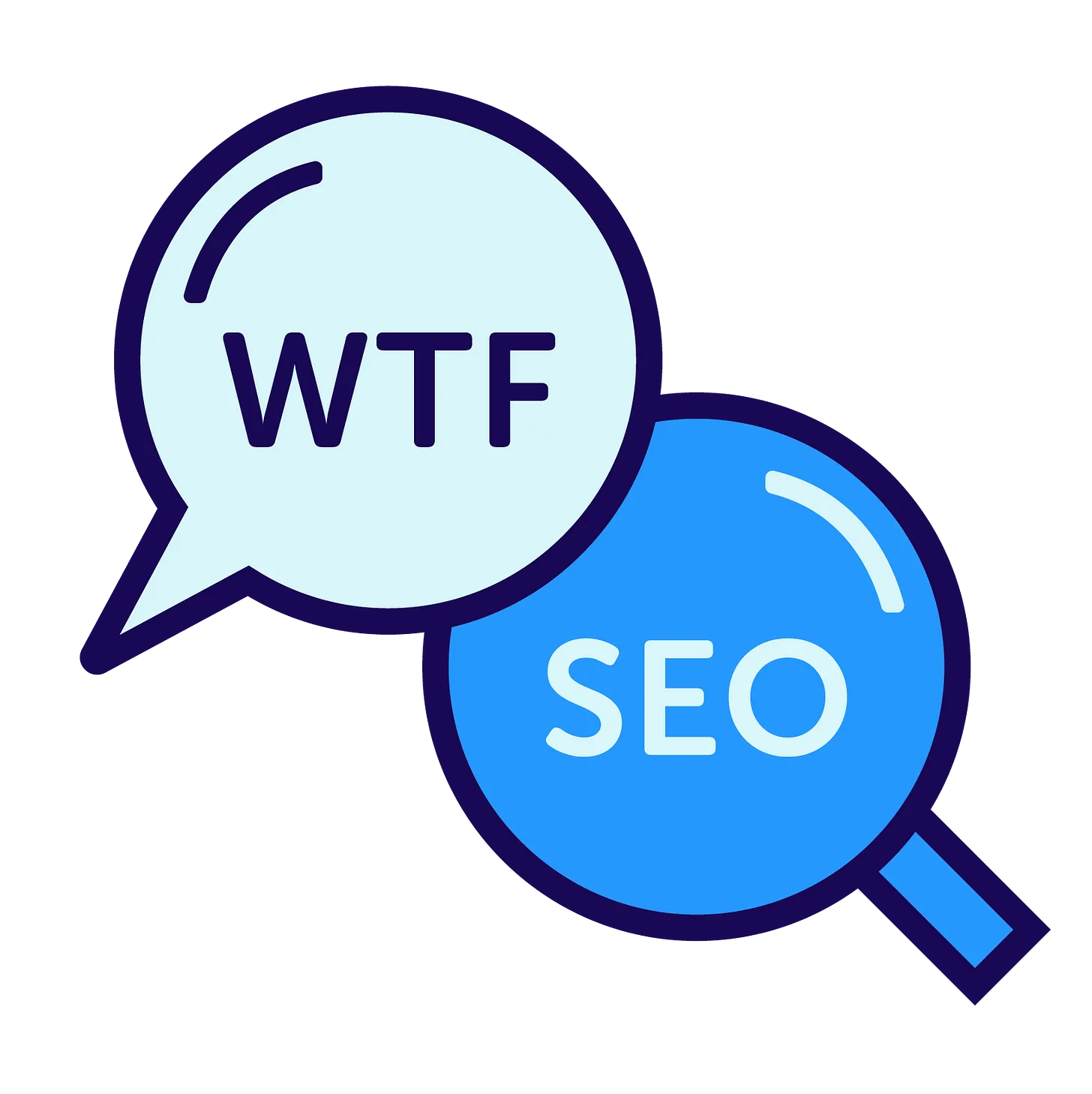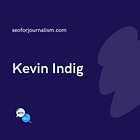What publishers need to do about zero-click search
14 experts gave us their actionable insights on what publishers can do in the face of a zero-click future.
#SPONSORED
📉 Is Google’s AI Overview stealing your news traffic? NewzDash tracks AI Overviews for ALL trending news queries:
💡See which queries trigger AIOs
💡Track AIO presence in SERPs
💡Track your AIO rankings/mentions
💡Measure impact on News Visibility
💡Track time for AIOs to appear after events start
💡Understand AIO patterns (eg 6-9 hours post-event)
Hello, and welcome back. Jessie here, back from peak autumn in Ontario. We went to an apple orchard, got lost in a corn maze (designed for children 🙃), and went to a sad indie boy concert.
This week: Experts weigh in on what to do about zero-click search. We talked to 14 news SEO consultants and experts working at top publications including Vox Media, ESPN and The Telegraph to get their actionable insights on what publishers can do now.

Let’s get it.
THE EXPERTS
Fourteen news SEOs contributed and what emerged were a set of key themes: reducing dependence on Google, building direct engagement with readers and diversifying the overall traffic picture.
Responses have been lightly edited for length and clarity.
Alexia LaFata, senior manager for SEO at Vox Media
A zero-click search world poses traffic challenges for publishers, but Google is still a huge traffic driver. While it’s important to grow newsletters, podcasts, and other sources of audience, publishers need to figure out how to maintain visibility in search wherever they can.
Search is a behavior. The same loyal user who signs up for a newsletter also uses Google to search for information. Overall, your goal as a publisher should be to build a brand so strong and authoritative that a reader will want to check out your content no matter where in the digital landscape you appear.
Dip your toes into generative engine optimization (GEO). Mentions and citations as a key performance metric keep your website relevant and visible in the new AI search landscape. But as long as AI search engines are a small traffic source, I would recommend only prioritizing GEO insofar as it also supports other editorial and business initiatives.
Barry Adams, SEO for Google News and Polemic Digital
Now that the chase after clicks is a dead-end strategy, publishers need to think about how they can maximize their audience loyalty and engagement. That means talking to your audience, understanding what they expect from you, and delivering that in spades. Engage with your readers, ask them what they want, and provide meaningful value as a publisher that builds loyalty and drives repeat visits.
Clara Soteras, SEO consultant for news publishers
We should invest much more in breaking news, as Google continues to highlight this content — it remains one of the few truly distinctive elements media outlets can offer.
Beyond that, it’s essential to strengthen both the brand and the product itself, building something genuinely unique that fosters audience loyalty.
We should also connect brand promotion more closely with physical events and community-building initiatives, creating experiences that competitors simply can’t replicate.
Ultimately, focusing on the real needs of the audience — whether informational, entertainment or service-driven — will be key to shaping the future of SEO and ensuring a sustainable, long-term strategy rather than a short-term approach.
Garrett Sussman, marketing director at iPullRank
Publishers need to stop chasing Google’s scraps and start doubling down on their brand and other digital channels to grow their audience.
We ran a UX AI Mode study with a news headline element, and a consistent theme emerged: readers still go straight to the sources they trust.
To survive zero click, build content that looks alive and resonates with visuals, layout, local voices, and up-to-date reporting that carries your distinct perspective.
Harry Clarkson-Bennett, SEO Director for The Telegraph and Leadership in SEO
Anything that can be answered with almost no follow-up by a zero-click search is not much of a publisher play anymore. But there’s some nuance to this. Some zero click search may be an essential part of the journey. If you’re a subscriber business, your audience might want to know a particular schedule or fairly functional information about an event.
If it’s a search-only play, I would seriously question whether that content is worth the investment. But if it’s a wider part of the puzzle, either as a jumping off point for the customer journey or something your subscription audience is interested in, it may still be worth doing.
If you want to be fancy, you could start identifying queries in Google Search Console that have an AI Overview (AIO), track their performance over time and cross-reference that with revenue. This should go some way to helping you understand the impact top of the funnel queries have on your bottom line and whether it’s worth doing.
Jenna deJong, audience growth strategist at Newsweek
Think of social as the new search.
Google isn’t the only place where folks search for information: platforms such as Reddit, YouTube, and TikTok are also search engines. They’re also where a lot of younger audiences are spending more time.
Search professionals are already the best at pitching and optimizing content for Google, so apply those same skills to these other platforms.
Joy Johnston, news SEO strategist at Trisolute News Dashboard
To protect against zero-click search, publishers should leverage the topic expertise that makes their brand distinctive. A review of three months of AI Overview keyword data in the Trisolute News Dashboard shows that space and health topics were most likely to trigger an AIO – surface-level content in these areas will no longer suffice.
Find a way to deliver original, helpful content with expert analysis or focus on topics where your publisher brand demonstrates authority and can deliver a unique perspective that an AIO cannot.
John Shehata, CEO and founder of NewzDash
We’ve seen platform cycles before: social once outpaced Google, and then dropped massively. Social optimization never went to zero; it just shifted from pure clicks to brand awareness and digital footprint.
Zero click doesn’t mean zero value; it means the click is deferred, with the search results page acting as a distribution layer you must win first.
For breaking and major news, NewzDash data shows Google treads cautiously: AI Overviews appear in under 4 per cent of cases and typically lag by 6-9 hours – creating a durable window where original reporting still earns the click.
Publishers should rebalance KPIs from sessions to include share of answers, direct returners. They should focus on content that LLMs and AI can’t or will not compress out of the gate (live coverage, hard news, unique data/opinion). Search won’t go to zero, and even if clicks drop for some news publishers. It remains the primary channel for publishers. We are simply seeing the emergence of a new traffic baseline.
Kevin Indig, growth advisor and author of Growth Memo
Every click counts, so make it count. Build sign up-worthy assets like newsletters so you can retain and engage with visitors.
Lean into Top Stories and Google Discover. Evergreen content has a much higher zero-click percentage than news content. Invest in net-new news content rather than commenting on a story that someone else broke (unless you have something new to add).
Content that targets topics with a high share of zero-click results might still make sense – but distribution on Google less so. But on TikTok, Instagram and YouTube? Might work really well!
Leonie Roderick, deputy digital director at The i Paper
There’s good news and bad news. First, the bad: there is no easy answer to the zero-click search challenge. The good: it’s driving publishers to sharpen their strategies, become more inventive and focused on owning their audience relationships.
For starters, publishers should revisit their areas of authority and grow wider communities around them. Choose your niche(s) carefully, and then build out direct relationships through newsletters, podcasts, social video series and memberships that bring audiences straight to you or allow you to monetize them.
Invest in unique, high-value formats that cannot be easily replicated or summarized on the search results pages. While high traffic numbers might seem like a worthy goal, return visits and brand recognition are the true winners.
Louisa Frahm, SEO director at ESPN
Emphasize brand visibility and direct relationships with readers. Encourage users to share their favourite content across their preferred platforms
Create articles with straightforward summaries, FAQ formatting, and schema markup to become a reliable source modules can pull from. Provide deep dives on appropriate topics to showcase E.E.A.T within your newsroom (especially during breaking news windows when readers have urgent needs).
Capitalize on alternative channels (like Google Discover, apps, newsletters, social media, and podcasts) which can highlight search-friendly topics and expand the reach of your content.
Nicola Agius, director of SEO and Discover at Reach PLC
Our appetite to connect with other humans isn’t going anywhere, no matter what Google or Bing throw at us. Be honest: how many times have you read an article or social media post and headed straight to the comments to check out the reactions? Things are changing, but lean into what you can offer that AI can’t. Fewer clicks isn’t the same as zero clicks.
Oleg Korneitchouk, news publisher consultant
Publishers need to reduce their reliance on search, while understanding that it’s still one of the largest traffic channels.
To double down on what works, look at groups of articles and track traffic changes month over month. Identify the topics or article styles (for example, by the numbers explainers or interviews) that outperform on Search and Discover. Never cut what paying subscribers engage with most.
To maximize brand presence, authentically show up in the places (for example, on podcasts) your readers are. Show off your E.E.A.T and provide real value. Since modern search looks at all of these surfaces to define and recommend you to searchers, be everywhere. Without a well-defined web presence, you won’t show up at all. That’s the real zero click search.
Capturing visitor information is really tricky. It relies on using a combination of UX, CRO, audience research, personalization, product/service offerings, and dynamic regwalls/paywalls/newsletter sign-ups to increase the number of leads you collect per website visit. Run A/B tests to figure out what moves the needle. Then provide value without being overwhelming. Instead of flooding their inbox, ask a question – any question! – that encourages engagement and helps build a more personal relationship, then deliver on the answer.
Ryan Restivo, founder of the YESEO app
The authorship lessons WTF is SEO? shared at ONA really connected with me: the important thing is for publishers to be on every platform, building a well distributed portfolio as your reporting brand. Publishers should encourage reporters to be on as many platforms as possible. Even when one platform is working really well (for example, Google Discover), the best strategy is a balanced portfolio. The biggest lesson of the last decade is publishers can’t be reliant on one platform.
The bottom line: All publishers are facing the looming challenge of zero click search. The remedy will vary between outlets, but there are core principles: search traffic still matters, but it’s necessary to diversify the overall traffic puzzle. Focus on what only your site and your reporting staff can do (and do better than AI), while finding readers across the web, on social platforms and offline.
#SPONSORED - The Classifieds
Get your company in front of more than 13,000 writers, editors and digital marketers working in news and publishing. Sponsor the WTF is SEO? newsletter!
THE JOBS LIST
Audience or SEO jobs in journalism. Want to include a position for promotion? Email us.
BBC Studios is hiring a Managing Editor, Audience & Curation (New York or Washington, USA)
RECOMMENDED READING
Google news and updates
🤖 Google: AI Mode is available in more than 35 new languages and over 40 new countries and territories.
🤖 Barry Schwartz: Google is testing using AI-generated descriptions to replace publisher meta descriptions on results.
🤖 Anu Adegbola: A new “Sponsored results” label is being rolled out globally.
Even more recommended reading
🖱️ Search Engine Journal: 28 expert-level prompt examples and templates for SEO.
🤓 Kevin Indig: What our AI Mode user behavior study reveals about the future of search.
⌨️ Rand Fishkin: We’ve learned more about how to appear in AI answers.
💪 Barry Adams: AI survival strategies for publishers – including Google Discover and multimedia content.
🗞️ Press Gazette: About six in 10 of the top leading UK news websites fell down Google rankings in 2025.
📓 Search Engine Journal: How ChatGPT, Perplexity, Gemini, Claude, and DeepSeek generate and cite answers.
Beyond Reach: Audience collaborations and cursed models
What did you think of this week’s newsletter?
(Click to leave feedback.)
Catch up: Last week’s newsletter
Have something you’d like us to discuss? Send us a note on Twitter (Jessie or Shelby) or to our email: seoforjournalism@gmail.com.
Written by Jessie Willms and Shelby Blackley












